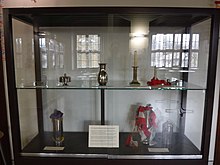Conradi-Horster
Friedrich Wilhelm Conrad Horster (* 1870 in Crossen on the Oder , † 1944 in Strausberg ), artist name "Conradi-Horster", was a German magician with over 6000 full-length performances. He was the creator of tricks and magic devices , author of around 50 specialist publications, president of the Magic Friends Association and friend and advisor to internationally known magicians of his time.
Life
Friedrich Wilhelm Conrad Horster was born the son of a Prussian civil servant family. He had his first contact with the art of magic at the age of ten in the former Tetschen-Bodenbach on the occasion of a guest performance by Amanda Oeser-Ganser , who later became "Armida". As a student, his first literary attempt in the field of magic ended his stay at the Dresden Kreuzschule . After completing his commercial training, he became a co-owner of the Hamburg trading company "Borwig & Horster" and had his first appearance in 1888 with a full-length stage show in Neumünster / Holstein and soon expanded the company's range to include the trade in magic articles.
As a result of the cholera epidemic in 1893, the headquarters of the “Borwig & Horster” company were relocated to Dresden. A publishing house was founded which later operated in Berlin under the name Horsterscher Verlag . Horster published the "Modern Card Artist", which was widely recognized and translated into several foreign languages, as well as a periodical magazine. Horster provided the programs and equipment for Kaiser Wilhelm II's annual trips to the north . The year 1896 saw the creation of the “first magic apparatus factory on the continent Horster and Kluge”.
After an intermediate stage in Nuremberg, (Berlin-) Schöneberg became the seat of his “Academy for Magical Art” and the company “Horster'scher Verlag” in 1903 . With the relocation of the company to the center of Berlin ( Friedrichstrasse No. 17) with manufacturing, retail and mail-order business in 1904 , the company, which was then renamed Magic Headquarters, gained international renown and was referred to in professional circles as the “Mecca of magicians”.
Conrad Horster died at his second home in Strausberg near Berlin. The shop at Friedrichstrasse 17 was converted into a food makeshift sales point. The “magic center” was only closed in 1990.
literature
- FW Conradi: Magical Library. Volume 12: The humorous magician. 2nd Edition. Horsterscher Verlag, Berlin 1918.
- Volker Huber: Horster. Bibliography of the magic books by FW Conradi-Horster. Huber, Offenbach 2007, ISBN 978-3-921785-92-8 .
- Waldemar Hans Horster: The magician and his grandson. FW Conradi-Horster. From the life story of the magician . Huber, Offenbach 2012, ISBN 978-3-921785-99-7 .
Web links
- Literature by and about Conradi-Horster in the catalog of the German National Library
- Website about Conradi-Horster by Dr.W. and G.-F. Horster
- Website about Friedrich Wilhelm Conrad Horster
- Magic headquarters (digitized, PDF; 3.8 MB)
- Magic headquarters: Jumbo catalog (digital copy, PDF; 3.2 MB)
- Rare Conradi Horster Tape: Conradi Horster with family members in front of his store in Friedrichstrasse 17 , film recording on YouTube , accessed on February 10, 2013
Individual evidence
- ↑ Friedrich Wilhelm Conrad Horster on the homepage of "Friedrichstrasse 17 Wohnbau GmbH & Co. KG", accessed on November 5, 2012
| personal data | |
|---|---|
| SURNAME | Conradi-Horster |
| ALTERNATIVE NAMES | Horster, Friedrich Wilhelm Conrad (real name); Horster, FWC; Conradi, Friedrich Wilhelm; Conradi, FW |
| BRIEF DESCRIPTION | German stage magician |
| DATE OF BIRTH | 1870 |
| PLACE OF BIRTH | Crosses |
| DATE OF DEATH | 1944 |
| Place of death | Strausberg |
